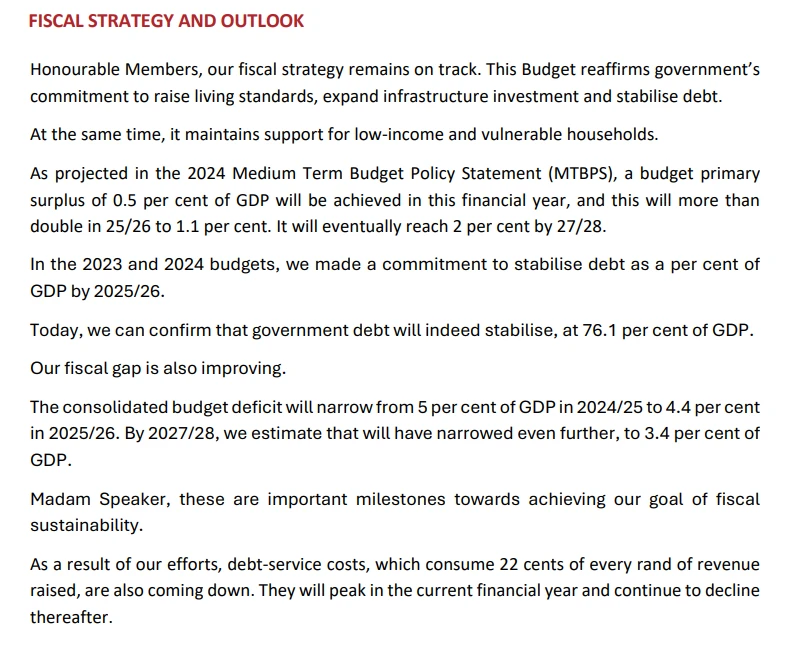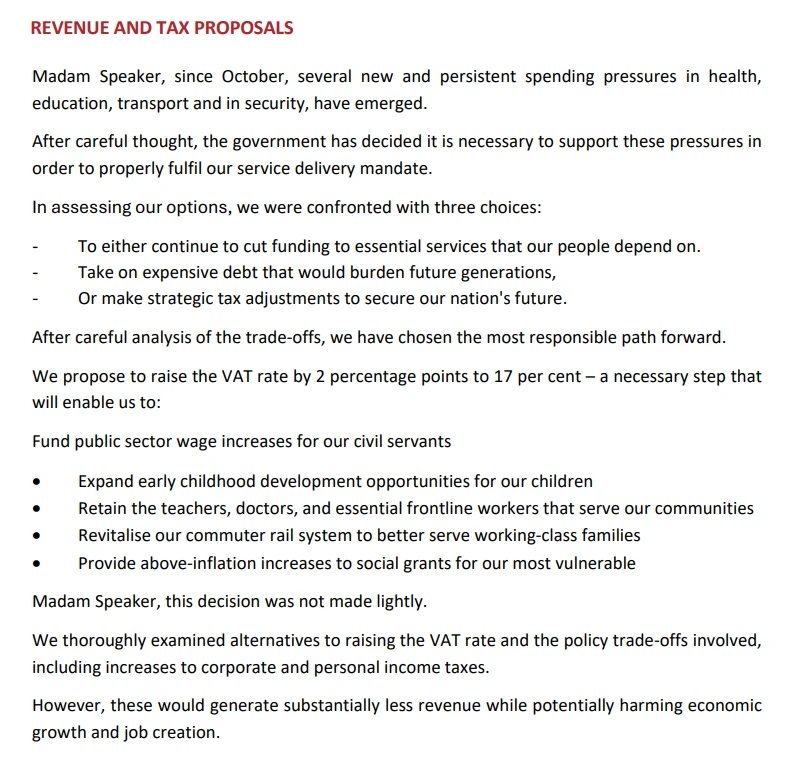This week’s non-budget reveals a lot about the policy direction of the GNU, and the ANC’s position in the driving seat.
There we were on Wednesday at five to two, all ready with a cup of tea (but wishing we could afford a cookie), to await our financial lord and master. Enoch Godongwana was about to tell us just how deep in the mire South Africa’s economy really is, and how much more we’re going to have to cough up for government services of ever-declining quality.
Finally, we would learn how exactly Cyril Ramaphosa would make good on his State of the Nation promise to raise economic growth to three percent – which is inadequate, but better than nothing.
Although there had been rumours and news of ructions in the morning, culminating in an emergency cabinet meeting, nobody expected what happened next.
Adjourned
More than 15 minutes late, speaker Thoko Didiza called the National Assembly to order, before dealing with a complaint from Julius Malema that without a microphone the voice of the voiceless was voiceless.
She then proceeded to the first order of business for the day: to declare the sitting adjourned, indefinitely.
That’s it. That was Budget Day 2025. Cue complaining and self-justifying from the various parties in attendance, which created a pleasant drone for an afternoon nap.
Sneaky
What happened reflects very poorly on the ANC and raises doubts about the stability of the Government of National Unity.
The National Treasury, headed by finance minister Enoch Godongwana, had briefed the 10 parties two weeks before the scheduled budget speech sitting, and presented a draft budget to them. In his presentation, he indicated that they could expect an increase in the value added tax (VAT) rate, but he didn’t say by how much.
Everyone assumed it would be one percentage point, as the then-ANC government had done in 2018.
All appeared to be well, until the very morning of the budget announcement, when Godongwana again briefed the GNU partners. This time, he presented the final budget.
Apparently without even the knowledge of the deputy finance minister from the Democratic Alliance (DA), Ashor Sarupen, Godongwana had snuck in a whopping two percentage point VAT increase, raising it from 15% to 17%.
To their credit, the DA and other GNU partners revolted, and threatened to vote against the budget if it was tabled in Parliament in its present form. Without them, the government wouldn’t be able to pass a budget.
President Cyril Ramaphosa called an emergency cabinet meeting for 12 noon, a mere two hours before the budget was supposed to be presented to the National Assembly. This meeting failed to resolve the differences. The DA and its allies in the GNU stood firm.
The only option that remained was to postpone the budget and its associated spending and division of revenue bills until a future date. That date will be 12 March 2025.
Cross-purposes
This raises some serious concerns. Clearly, the parties in the GNU are working at cross-purposes, and do not communicate well.
It is unforgivable that in a supposed unity government, the junior parties only learn what’s in the final budget on Budget Day. That’s not how you run a coalition government.
The ANC appears to be happy to barge ahead with its own policies – such as signing the Expropriation Bill – without so much as a howdy-do to the GNU. By deception, they tried to strong-arm their way to a tax increase that they knew the GNU partners would not rubberstamp.
The ANC had clearly hoped that their GNU counterparts would be unwilling to force the unprecedented step of delaying the tabling of the budget. Happily, they were wrong.
This doesn’t fill me with confidence about the future stability of the GNU, however. There are many more budgets to be passed, and many more opportunities for the entire leaky ship to founder.
Tax burden
Another reason for concern is the fact that South Africa is already heavily burdened with tax. Treasury seems to be well aware that taxes are already at, or beyond, the optimum of the Laffer Curve, beyond which increased tax rates lead to lower tax revenues because they depress production and increase evasion.
This is why it didn’t want to increase personal or business taxes, and targeted VAT instead.
The increase in the VAT rate would have been partially offset by expanding the basket of VAT-exempt goods, raising tax brackets to give low-income earners some inflationary relief, and increasing social grants “significantly above inflation”.
This, despite the fact that in 2018, the Davis Tax Committee explicitly recommended against zero-rating goods, because VAT exemptions benefit the rich more than the poor and are expensive. It would be better, the report found, to eliminate zero-ratings altogether, reduce the VAT rate, and spend what remains on direct aid to the poor.
Godongwana would have announced a real GDP growth forecast for 2024 of 0.8%, lower than the already measly 1.1% anticipated in the Medium-Term Budget Policy Statement of October 2024. When your economy is this stagnant, it is good policy to cut taxes to stimulate growth. Increasing the tax burden can only stifle the economy further.
Non-compliance
It goes without saying that a two-point VAT increase would have been disastrous for ordinary South Africans, and especially for the poor, who spend a far greater share of their income on consumption than the rich. What has become known as the cost-of-living crisis is biting, up and down the income groups.
South African Revenue Service (SARS) commissioner Edward Kieswetter had, in fact, stated that the previous VAT increase had not significantly raised revenue, but had increased non-compliance, especially among small businesses. He said that rather than raise tax rates when they’re already as high as they will go, Treasury should instead invest in SARS capacity to collect taxes that are due but uncollected, which could raise up to R800 billion per year.
A hot microphone picked up the fact that Godongwana is not best pleased with Kieswetter having an opinion.
Yawning budget deficit
Reading the speech that would have been delivered, two things stand out.

The hope that the minister had of beginning to close the yawning budget deficit, and stabilising debt, seems to have hinged on the massive VAT increase, as did the substantial increase in non-interest expenditures for the next three years.
Clearly, a budget written by the ANC is not an austerity budget. Nor is it a budget that follows the advice of The IRR’s Blueprint for Growth 2: Slash Waste, Cut Taxes, written by Gabriel Crause, which contemplates potential savings of R500 billion just by picking low-hanging fruit.
The budget simply papers over the fiscal cracks with further tax increases, which entrenches the culture of waste and corruption, and perpetuates the decay of public services that government revenue is supposed to fund.
Once again, we’ll get worse services for higher taxes.
Civil service wages
What also stood out is how the revenue VAT increase would be spent.

The very first priority for Godongwana is: “Fund public sector wage increases for our civil servants.”
Then he added some widows-and-orphans bullet points to make it all sound a little more palatable.
Clearly, the ANC does not share my view that the civil service is over-paid, over-staffed, and under-worked. Around the country, civil service jobs are the cushiest and best-remunerated jobs around. They typically earn more, and have better perks, and work shorter hours, than comparable private sector jobs.
I don’t want to diss all civil servants, because I know that among them are are some excellent, honest and hard-working people devoted to public service, but there is a lot of fat to be cut, and a lot of attitude to improve.
Growth budget
The question now is whether the intervention by the GNU partners will result in a substantially improved budget.
In a press statement, John Steenhuisen, leader of the DA, took credit for defeating the two-point VAT increase, and added: “Following our defeats [sic] of the ANC’s plan to hike VAT, we will now fight with the same vigour to introduce a new budget that is anchored in growing the economy, rather than increasing taxes or debt.”
In a paper for the IRR last year, I evaluated the DA’s pre-election manifesto, and concluded that it was largely (although not wholly) consistent with a pro-growth economic policy.
Colour me cynical, but I doubt that’s what we’re going to get now that the ANC’s sneak attack on ordinary South Africans has been foiled.
It seems that the DA, and the other GNU partners, were a-okay with a one-point VAT increase, and I can’t see the ANC sacrificing much of its tax-and-spend socialism and state-led stagnation policy on the altar of GNU amity.
Knowing the ANC, this was just another example of its favourite negotiating strategy: propose something outrageous, and then look like the reasonable party willing to make compromises when it “meets us halfway” while getting exactly what it really wanted in the first place.
The DA may crow about its victory now, but it will take a lot more to convince me that the party is actually making a substantive difference in the policy direction of the government as a member of the GNU.
As it stands, South Africa is still firmly on the wrong track, and I’m not convinced the DA, or any of the other GNU parties, even have a hand on the steering wheel the ANC has so firmly in its grip.
We’ll see whether the GNU is worth the paper it was signed on, on 12 March.
The views of the writer are not necessarily the views of the Daily Friend or the IRR.
If you like what you have just read, support the Daily Friend
Image: Composite image of Enoch Godongwane’s face superimposed on a man driving a bus. Public domain bus driver photo from RawPixel. Public domain photo of Godongwana’s face from GovernmentZA on Flicker.

